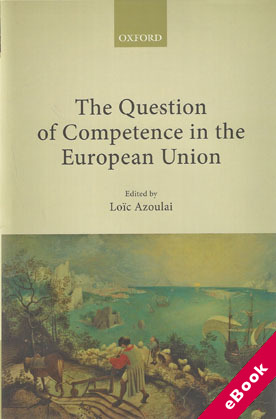
The device(s) you use to access the eBook content must be authorized with an Adobe ID before you download the product otherwise it will fail to register correctly.
For further information see https://www.wildy.com/ebook-formats
Once the order is confirmed an automated e-mail will be sent to you to allow you to download the eBook.
All eBooks are supplied firm sale and cannot be returned. If you believe there is a fault with your eBook then contact us on ebooks@wildy.com and we will help in resolving the issue. This does not affect your statutory rights.
The classic debate surrounding the prolific role of the European Union in defining spheres of competence and power relationships has long divided scholarly opinion. However, in recent years, the long-standing acquiescence to the broad powers of the Union has given way to the emerging perception of a competence problem in Europe.
For a long period it was taken for granted that the European Community could act whenever its action was justified on the basis of the widely interpreted objectives of the Treaties. However this context has since changed. There is a widespread perception of a competence problem in Europe and the overabundance of provisions limiting the Union's competences is one of the most obvious marks left by the Lisbon Treaty.
This book discusses the extent to which the parameters of power throughout the Union and its Member States have been recast by the recent implementation of the Lisbon Treaty and doctrines developed by the European Court of Justice. Comprised of contributions from a vast array of leading practitioners and academics in the field of EU Law, this volume assesses the debate surrounding the political identity of the European Union, and further illustrates the relevance of the Federal theory of sharing competences for the development of EU Law.
Finally, the question of new potential limits to Union's competence is addressed. If anything, this broad reflection on the notion of competence in the EU law context is a way of opening up the question of the nature and contours of the political identity of the European Union.